Schedule
- Smart Mobility
- September 20, 2022
- Smart Robotics (Manufacturing, Aqua)
- September 27, 2022
- Quantum Science (Computing, Sensor)
- September 29, 2022
- Artificial Intelligence
- September 30, 2022
- Smart Workplaces
- October 7, 2022
- Achievement Presentation
- November 9, 2022
Overview
Quantum Science (Computing, Sensor)
Instructor:
Quantum sensor: Prof. Toru Hirahara (School of Science)
Quantum computer: Prof. Tetsuo Kodera (School of Engineering)
Prof. Jun Yoneda (Tokyo Tech Academy for Super Smart Society)
Learn about quantum computing and quantum sensing –two representative quantum technologies –from the basics to the frontiers of research. Conduct some practice to understand the basic concepts and techniques commonly used in quantum science experiments.
AM: Lecture on quantum computing and the content of the demonstration. Learn how to cool down and characterize qubit devices through actual measurements of quantum phenomena.
PM: Lecture on quantum sensing and the content of the demonstration. Learn how to synthesize and characterize the properties of atomically-thin superconducting films used for quantum sensors.
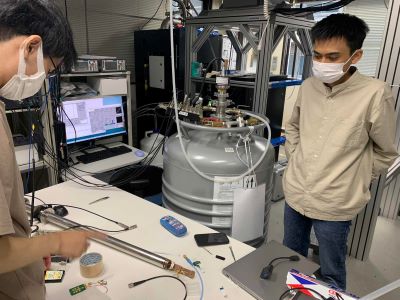
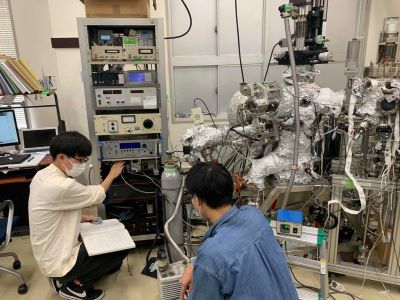
Artificial Intelligence
Instructor: Prof. Takahiro Shinozaki (School of Engineering)
Lecture on the mechanism of neural networks and its implementations. Exercise on learning and evaluating neural networks with real data. Throughout this course, students learn how to construct and apply neural networks to various problems.
AM: Principles of Neural Networks / Gradient Descent and Backpropagation / Variations of neural network structures / Unsupervised learning and reinforcement learning
PM: Exercises using Google Colab or JupyterLab on Tsubame / (PyTorchbasics and applications)
Smart robotics (Manufacturing, Aqua)
Manufacturing
Instructor: Prof. Tomohisa Tanaka (School of Engineering)
At first, the characteristics of multi-axis multi-tasking machine tools widely used today, and the flow from designing to fabrication of complicated-shaped parts using these machine tools will be explained. Then computer-aided design and NC machining using programs created by CAM based on designed 3D-model will be demonstrated.
Aqua
Instructor: Prof. Motomu Nakashima (School of Engineering)
This exercise starts with lectures on the basics of underwater robotics and the propulsion mechanism of bio-mimetic underwater robots. Next, simulator software for biomimetic underwater robots will be introduced. Using the simulator, a bio-mimetic underwater robot will be planned and designed individually, and its performance will be evaluated.
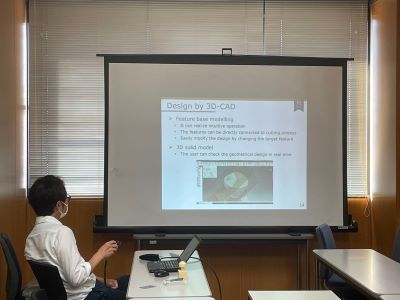
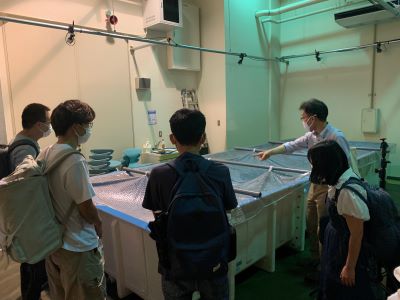
Smart Mobility
Instructor: Prof. YU Tao (Tokyo Tech Academy for Super Smart Society)
Automated driving, Intelligent Transport Systems (ITS), and next-generation wireless communication systems as components to realize smart mobility will be outlined. Students will then experience operating and riding in an automated driving vehicle and millimeter wave communication with the road-side unit through exercises.
AM: Lectures on automated driving, ITS, and next-generation wireless communication
PM: Exercises using an automated driving vehicle
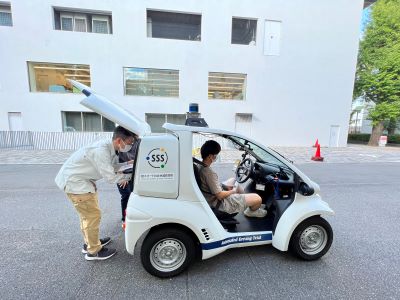
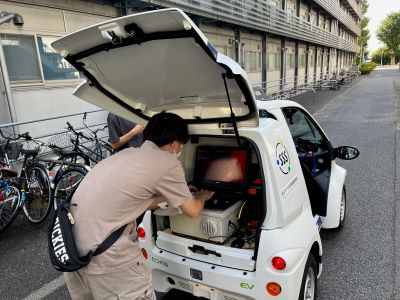
Smart Workplaces
Instructor: Prof. Naoki Kagi (School of Environment and Society )
Prof. Wataru Umishio (School of Environment and Society)
Visit the office in Otemachi, where the sensor network was built. Learn the latest buildings and technologies, and discuss the future workplace.
- Site visit (Otemachi 3×3Lab Future)
- Introduction to the Smart Workplace research and education field
- Introduction of each room, explanation of technology and sensors
- Visualization of human thermal comfort
- Discussion & Presentation (About the future workplace)
Achievement Presentation
Presented in group work format (3~4 people x 5 groups). Based on the exercises, each group presented their research ideas to integrate different fields.

